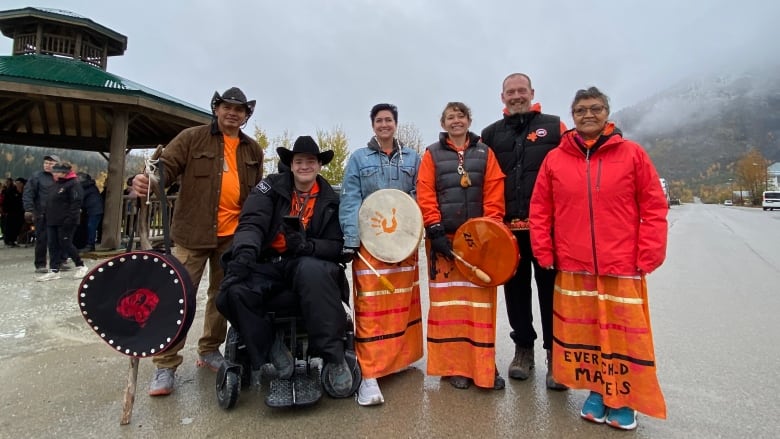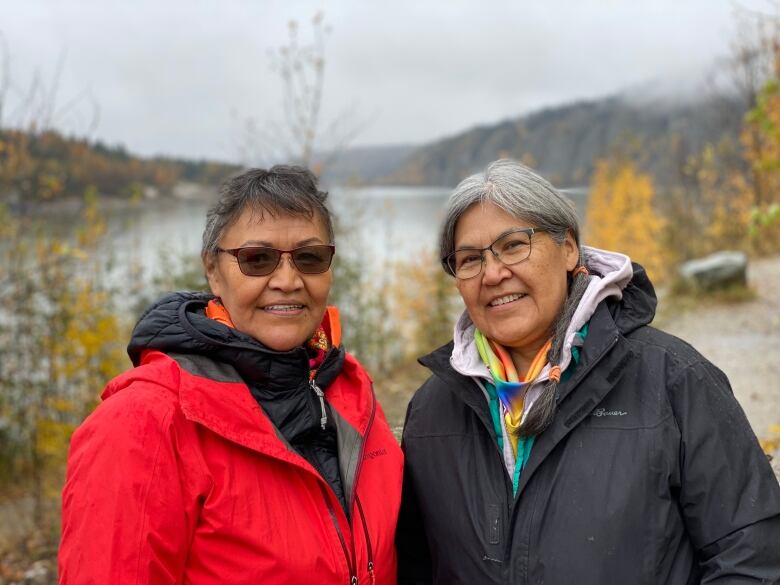Warrior Walkers begin their journey from Dawson City, Yukon, to Whitehorse
"My pain doesn't matter when we're walking for these children," said one walker

WARNING: This story contains details some readers may find distressing.
Despite the cold of the season's first snowfall groups gatheredaround a sacred fire beside the Dnoj Zho Cultural Centre to send off the Warrior Walkers Sunday.
The Warrior Walkers formed in 2021 when ahandful of Yukonersdecided to embark ona 2,100 kilometre walk from Whitehorse to Kamloops, B.C., to honour children who died at residential schools in Canada.
This time the group is walking 533 km from Dawson City, Yukon,to Whitehorse.
"I am walking because I am a residential school survivor" said Lorraine Netro, a Vuntut Gwitchin citizen and original Warrior Walker.
"There was a residential school here in Dawson City that some of theGwitchinpeople from my nation attended."

Netro said she walks to continue theconversation around residential schools, and the intergenerational trauma it causedFirst Nations families.
"We will never, ever forget that our people have suffered at the hands of other people. We want to walk to let people know that we're still here as First Nations people in the Yukon, and across Canada."
Netro saysto keep herself motivated, she thinks about all the suffering her people have endured.
"I remember our people that were hungry because they were not fed. I remember our people that missed home and that were lonely for their families," she said.
"If I'm losing energy and I'm starting to feel weak I think about them."

Louise Drugan and Charmaine Christiansen areTrondk Hwchincitizens from Dawson.
They both walked the first 14 kilometres on behalf of their First Nation.
"It's for the kids. It's for the people. To honour them. It's a sad story but this is a way to show your emotion," Drugan said.
"It's important for me to do this walk just to represent my family members, and ancestors who went to residential schools," Christiansen said.
"You know there is a lot of sadness but there's a lot of growth and strength as we come together."

MarciaTelepand Corinna Yuillboth came to Dawson to join the walk.
Telep is a member of the Na-Cho Nyak Dun First Nation from Mayo, Yukon, and Yuill is a member of the Tahltan Nation.
They both said they are walking to honour their family members who attended residential schools.
Like Netro, Yuillalso walked to Kamloops from Whitehorse in 2021. She said when times get hard along the way she puts one thing in the front of her mind to keep her moving forward.
"I just tell myself the children that ran away from these schools," Yuill said.
"That tried their everything to get home. Never had a good pair of shoes to wear. Didn't have any warm gear to wear. They had no warm place to sleep at the end of the day. That I have nowhere to complain and that my pain doesn't matter when we're walking for these children."
Telepechoed Yuill.
"These children that never got to make it home," she said.
"We're walking for them to get them home. When they were cold and tired they didn't give up because they wanted to get home so we're not going to give up on them and we're going to keep going. Even if we're tired and blistered. We're going for the children."
The Warrior Walkers plan to arrive in Whitehorse for the national day of truth and reconciliation on September 30th.
They're encouraging all Yukoners to join them as they pass through each of the communities along the North Klondike Highway as they reach the territory's capital.
Support is available for anyone affected by the effects of residential schools, and those who are triggered by the latest reports.
TheIndian Residential School Survivors Society(IRSSS)can be contacted toll-free at1-800-721-0066.
A national Indian Residential School Crisis Line has been set up to provide support for former students and those affected. People can access emotional and crisis referral services by calling the24-hour national crisis line: 1-866-925-4419.
TheNWT Help Lineoffers free support to residents of the Northwest Territories, 24 hours a day, 7 days a week. It is 100% free and confidential. The NWT Help Line also has an option for follow-up calls. Residents can call the help line at1-800-661-0844.
In Nunavut, theKamatsiaqtut Help Lineis open 24 hours a day at1-800-265-3333. People are invited to call for any reason.
In Yukon, mental health services are available to those in bothWhitehorse and in rural Yukon communities through Mental Wellness and Substance Use Services. Yukoners can schedule Rapid Access Counselling supports in Whitehorse and all MWSU community hubs by calling 1-867-456-3838.












_(720p).jpg)


 OFFICIAL HD MUSIC VIDEO.jpg)
.jpg)



























































































